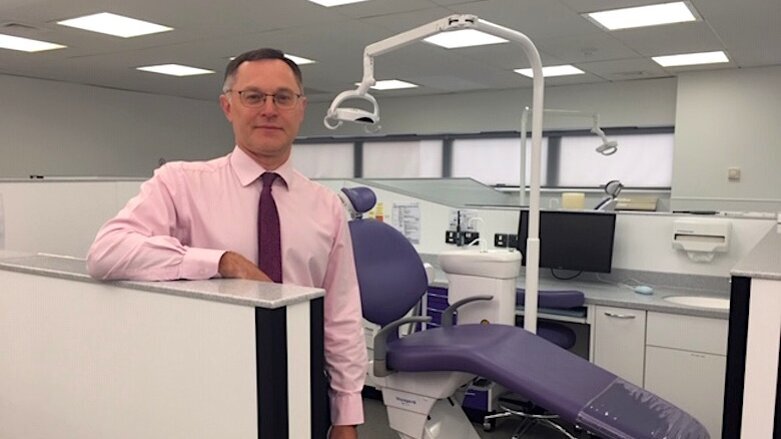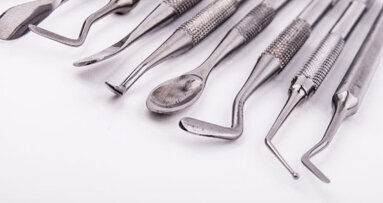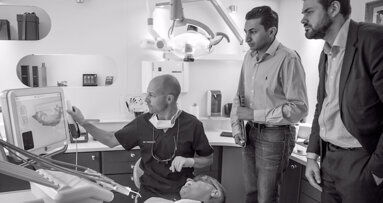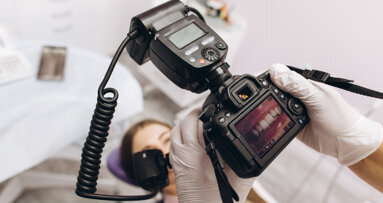Though routine mentoring has been widely used in other professions as a form of stress management, it remains relatively under-utilised in dentistry for a multitude of reasons. Dental Tribune International spoke with Dr Robert Seath, Clinical Director of the University of Portsmouth’s Dental Academy and the recent author of an article on this topic, about the most frequent stressors for dentists and the resistance to routine mentorship that exists in dentistry.
Dr Seath, in dentistry, stress is often discussed in relation to the patient’s experience, not to that of the practitioner. What are the most common sources of stress for practitioners?
What seemed to come out of the literature when I was looking into this topic was that the top stressors for general dental practitioners include not only the over-reliance on the so-called “treadmill approach” and treatment targets but also the high expectations of patients. Essentially, these factors stem from a concern about being able to provide an adequate level of care within the confines of the NHS system.
In addition, another big stressor for dentists is fear of litigation and concern about other business-related aspects of dentistry. Looking at the literature, a lot of dental professionals seem to have an expectation that patients are likely to be litigious, which is understandable, since the general rate of litigation is going up.
Can routine mentorship potentially reduce dental practitioners’ stress?
Having been a general dental practitioner for many years—on local dental committees, as a foundation trainer and so on—I’ve witnessed many situations in which practitioners end up in some sort of trouble and have to use the mentorship services of deaneries and indemnity societies. What I wanted to find out with this paper, essentially, was whether or not dentists are accessing these services too late.
Dental practitioners are a group of people who are invariably under occupational stress, which is not necessarily a bad thing. However, it can be hard to recognise within yourself the point at which this stress becomes overwhelming. Across the board, routine mentorship can be used to try to pre-empt and prevent this build-up of stress. Consequently, in this paper, I wanted to look at whether routine mentorship can give dental practitioners the time and space to engage in this form of self-reflection.
Whether there’s a need for routine mentorship in the general dental practice and whether there’s an appetite for it is an interesting dichotomy. The evidence that I gathered suggests that there isn’t a great desire for it to be introduced. This could be due to a lack of understanding as to what it is, or dental practitioners might simply feel that they don’t need it.
In your article, you mention that you found dental trainers were relatively receptive to the benefits of routine mentorship, yet also doubtful whether their colleagues would take it up. Why did they think this would be the case?
Generally speaking, the perception was that routine mentorship was one more thing to have to add into your everyday routine. One interviewee even wondered whether its introduction would possibly lead to more stress, since it would be yet another obligation to organise and schedule. It really depends, though, on the practitioner’s perspective: if you feel that it will be of benefit, then you’ll make time for it.
Ideally, routine mentorship could be part of a preventive approach to reducing workplace stress. However, we found that there was a general perception that accepting mentorship could almost be seen as a personal admission of weakness or failure. In my opinion, being able to recognise in yourself that you might not be able to cope with the situation that you are facing and knowing what steps you can take to deal with that needs to be the subject of a lot more open discussion. Dental practitioners are often very keen to maintain their professional image and are scared of showing vulnerability in adverse situations, and in a way, this attitude is programmed into us. This is a shortcoming that, hopefully, routine mentorship would help to address.
In the conclusion to your article, you mention that a hybrid model of mentoring and coaching could be a promising potential way forward. What is the difference between mentoring and coaching, and what would a hybrid model of these look like?
Broadly speaking, the interviewees often blurred the boundaries between coaching and mentoring. From my perspective, coaching is something that has an end point and which involves teaching someone to do a specific thing, whereas mentoring has no really defined end point and is more focused on allowing people to find their own way forward. As a coach, I might show you the best way to prepare a crown or to have a decent serve in tennis, whereas when mentoring, I wouldn’t necessarily be aiming for a specific outcome but instead providing the mentee with the tools to find his or her own solutions.
The hybrid model arose because the majority of the people I spoke to for this article really wanted to wait for a problem and then find a solution to it, which would involve coaching more than mentoring. However, with the incorporation of mentoring into this, it would allow the practitioner to see how the problem came about, whether there was anything he or she could have done differently and whether there were any warning signs that might have foreshadowed this problem. By combining coaching and mentoring, this proposed hybrid model would provide a way for dental practitioners to be self-reflective about their practice. This self-reflection is becoming an integral element of dentistry.
Editorial note: Dr Seath’s article, titled “Should mentoring be routinely introduced into general dental practice to reduce the risk of occupational stress?”, was published online on 26 July 2019 in the British Dental Journal.
Tags:
LONDON, UK: Dr Dave Cottam has been elected Chair of the British Dental Association (BDA) General Dental Practice Committee (GDPC) in a special meeting held...
A wide range of single-use disposable dental and surgical instruments is now produced by a number of manufacturers. Instruments are available for purchase ...
HUDDERSFIELD, UK: When used correctly, intra-oral scanners offer a wide range of benefits, including increased patient acceptance and reduced chairside ...
LONDON, England: The UK’s General Dental Council has emphasised its commitment to understanding and monitoring the evolving impact of artificial ...
LONDON, UK: While dental professionals across the world are hoping for the relaxation of lockdown restrictions and are anxious to reopen their dental ...
The greater and more flexible use of skills mix is steadily becoming one of the most efficient and effective ways of improving treatment outcomes in the ...
Dr Mahfuz Rahman is a dentist and founder of Frisco Dental Studio in Texas in the US. He is also a dental photography enthusiast and takes great pleasure in...
Dental practices are not particularly green. According to the Eco Dentistry Organisation, clinics generate 4.8 million lead foils, 28 million litres of ...
LONDON, UK: In recent years, tooth whitening has become an increasingly common form of aesthetic dental treatment. Though its provision is legally limited ...
Kindness to oneself and self-love are concepts that are often spoken about in the context of looking after oneself and supporting personal well-being. ...
Live webinar
Tue. 24 February 2026
6:00 pm UTC (London)
Prof. Dr. Markus B. Hürzeler
Live webinar
Tue. 24 February 2026
8:00 pm UTC (London)
Prof. Dr. Marcel A. Wainwright DDS, PhD
Live webinar
Wed. 25 February 2026
4:00 pm UTC (London)
Prof. Dr. Daniel Edelhoff
Live webinar
Wed. 25 February 2026
6:00 pm UTC (London)
Live webinar
Thu. 26 February 2026
1:00 am UTC (London)
Live webinar
Tue. 3 March 2026
4:00 pm UTC (London)
Dr. Omar Lugo Cirujano Maxilofacial
Live webinar
Wed. 4 March 2026
1:00 am UTC (London)
Dr. Vasiliki Maseli DDS, MS, EdM



 Austria / Österreich
Austria / Österreich
 Bosnia and Herzegovina / Босна и Херцеговина
Bosnia and Herzegovina / Босна и Херцеговина
 Bulgaria / България
Bulgaria / България
 Croatia / Hrvatska
Croatia / Hrvatska
 Czech Republic & Slovakia / Česká republika & Slovensko
Czech Republic & Slovakia / Česká republika & Slovensko
 France / France
France / France
 Germany / Deutschland
Germany / Deutschland
 Greece / ΕΛΛΑΔΑ
Greece / ΕΛΛΑΔΑ
 Hungary / Hungary
Hungary / Hungary
 Italy / Italia
Italy / Italia
 Netherlands / Nederland
Netherlands / Nederland
 Nordic / Nordic
Nordic / Nordic
 Poland / Polska
Poland / Polska
 Portugal / Portugal
Portugal / Portugal
 Romania & Moldova / România & Moldova
Romania & Moldova / România & Moldova
 Slovenia / Slovenija
Slovenia / Slovenija
 Serbia & Montenegro / Србија и Црна Гора
Serbia & Montenegro / Србија и Црна Гора
 Spain / España
Spain / España
 Switzerland / Schweiz
Switzerland / Schweiz
 Turkey / Türkiye
Turkey / Türkiye
 UK & Ireland / UK & Ireland
UK & Ireland / UK & Ireland
 International / International
International / International
 Brazil / Brasil
Brazil / Brasil
 Canada / Canada
Canada / Canada
 Latin America / Latinoamérica
Latin America / Latinoamérica
 USA / USA
USA / USA
 China / 中国
China / 中国
 India / भारत गणराज्य
India / भारत गणराज्य
 Pakistan / Pākistān
Pakistan / Pākistān
 Vietnam / Việt Nam
Vietnam / Việt Nam
 ASEAN / ASEAN
ASEAN / ASEAN
 Israel / מְדִינַת יִשְׂרָאֵל
Israel / מְדִינַת יִשְׂרָאֵל
 Algeria, Morocco & Tunisia / الجزائر والمغرب وتونس
Algeria, Morocco & Tunisia / الجزائر والمغرب وتونس
 Middle East / Middle East
Middle East / Middle East


















































Thorough information one must have to be gone through. Appreciated